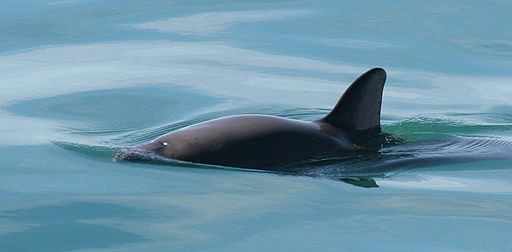By Ana Verayo, | January 06, 2017

There are only 60 vaquita porpoises in the wild today. (Paula Olson/NOAA)
Scientists are asking for special help from military dolphins to save a critically endangered porpoise species.These dolphins are part of a team called Seal Team 6, and they are specifically trained by the United States Navy to detect underwater mines and other potential marine hazards.
Like Us on Facebook
Navy officials are hoping to save the last populations of the vaquita, which is the world's smallest dolphin.
Vaquitas are often found in warmer waters in the Sea of Cortez in Mexico and Baja, California peninsula. However, they have been increasingly hunted for Chinese traditional medicine.
These expert dolphins have been trained to find these vaquitas so that an international team of researchers and scientists can transport them to a special holding facility. This means that they will be safe from the trawling nets of fishing boats where they die due to entanglement.
According to US Navy Space and Naval Warfare Systems Center's Jim Fallin, the specific task of the dolphins is to locate vaquitas. They will send a signal by surfacing and returning to the boat from where they were deployed.
When this plan gets approved, it will be the first step of a dangerous relocation project to save the vaquitas and probably the vaquitas' last chance to survive for the next 10 years.
During a 2014 survey, only 100 more or fewer vaquitas were found, about half of the population numbers reported from 2012. In 2016, the vaquita count was just 60. Scientists think that the species is already doomed.
Conservation efforts remain fragile since the vaquita is never found to survive and thrive in captivity. Apart from this, they are extremely elusive and have not been intensively studied.
Vaquitas are also known to reproduce slowly as one mature female can only give birth to one calf every other year. When the remaining females die in captivity, the species will also soon become extinct.
Vaquitas are not hunted down for Chinese medicine, but a special species of sea bass known as the totoaba is killed for this. The totoaba bladder is considered to be a delicacy and part of traditional Chinese medicine. Their bladders can reach almost US $9,000.
to catch a totoaba, which is also an endangered marine species, fishermen use mesh gill nets and drag them over oceans to snag everything like a filter, including the small cows of the sea, the vaquitas.
In September last year, the Convention on International Trade in Endangered Species demanded that Mexico, the US, and China share more information on totoaba busts and seizure to catch criminals and to further provide protection to the dwindling porpoise.
-
Use of Coronavirus Pandemic Drones Raises Privacy Concerns: Drones Spread Fear, Local Officials Say

-
Coronavirus Hampers The Delivery Of Lockheed Martin F-35 Stealth Fighters For 2020

-
Instagram Speeds Up Plans to Add Account Memorialization Feature Due to COVID-19 Deaths

-
NASA: Perseverance Plans to Bring 'Mars Rock' to Earth in 2031

-
600 Dead And 3,000 In The Hospital as Iranians Believed Drinking High-Concentrations of Alcohol Can Cure The Coronavirus

-
600 Dead And 3,000 In The Hospital as Iranians Believed Drinking High-Concentrations of Alcohol Can Cure The Coronavirus

-
COVID-19: Doctors, Nurses Use Virtual Reality to Learn New Skills in Treating Coronavirus Patients








